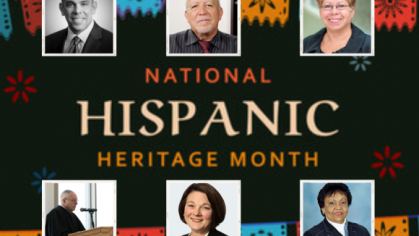This week is National Library Week—no better time to stop and reflect on the efforts of Dana Library faculty and staff to serve its users at Rutgers University–Newark in the midst of the coronavirus pandemic.
On March 21, Dana Library Director Consuella Askew notified Rutgers-Newark faculty that library services had moved online entirely, reassuring them that Dana Library faculty and staff were prepared to support a remote teaching environment effectively and seamlessly upon students’ return from spring break. This meant that nothing would circulate physically in or out of the building—no books, laptops, tablets, or reserved materials—and that information would be made available electronically.
The switch also meant the virtual reference service would become the first point of engagement between librarians and users. “We had virtual reference services prior to COVID-19,” Askew shared in a recent interview. Prior to the pandemic, librarians provided virtual assistance by phone, online chat, and email to accommodate situations where in-person service proved inconvenient. Dana Library added videoconferencing reference and instruction services in the wake of the pandemic.

“It’s part of a librarian’s ethos to help and serve our users,” said Askew. “We enjoy in-person interactions and feel that face-to-face encounters are more impactful. With videoconferencing, because users get to see our faces, it allows us to continue to deliver high-quality service in a more personalized manner.” Dana Library further expanded its personal touch in the virtual world with the recent launch of a social media campaign, #DanaLibraryAClickAway, which introduces library faculty and staff in their home offices/work spaces.
At the onset of the virtual conversion, library faculty and staff shifted their focus from primarily helping students to assisting the faculty body in transitioning physical materials to their online counterparts to ensure the timely availability of materials needed for their courses. Librarians also spent time researching suitable substitutes when situations warranted. “An emphasis on faculty assistance remains an ongoing process for us,” Askew noted, “as faculty prepare for their summer session courses, they can rely on help from our librarians to find electronic resources to integrate into those courses.”
More than a month into this new virtual reality, Askew has observed, “The pandemic has prompted Rutgers Libraries to heighten awareness of our robust and underutilized collection of electronic books. Before COVID-19, people would go online mainly to access full-text journal articles from Rutgers Libraries’ multitude of databases. We’re also receiving increased requests for streaming media such as videos.” In response, Rutgers Libraries has refocused its collection development efforts to provide access to more digital content. More than 650 e-books and 40 streaming media films have been purchased for direct use in the classroom and more than 40,000 additional e-books have been added to the collection to provide support for research. To further augment its electronic holdings, Rutgers Libraries has negotiated emergency access to the HathiTrust Digital Library. “Once activated, this resource will provide our community the ability to read almost 49 percent of our current physical holdings.”

Librarians also are poised to assist faculty with learning how to enhance their Blackboard capabilities by imbedding into their courses both tutorials on information literacy, critical thinking, and communications, as well as Leganto, an electronic course-reading-list tool. The tutorials and Leganto are library tools that will be available beyond COVID-19, Askew stated. “They empower faculty to have ubiquitous access to library resources within their virtual teaching environments. Faculty can use the tutorials, which are available to students 24/7, as course assignments or quizzes.” Leganto allows faculty to build reading lists for students and manage, edit, and update them in one place. Librarians can further assist faculty members with finding and obtaining materials that are not readily available.
In many respects, COVID-19 may have ushered in a “new normal” for Dana Library. Over the years, the circulation of physical materials has declined while traffic in the virtual world has increased, observed Askew. “It’s hard to definitively quantify the use of our electronic materials, since there is no standard metric across database vendors, but in general we’ve definitely seen increasing usage of electronic resources,” noting that much of that might be attributable to a growing comfortability with and preference for remote delivery.
Until Rutgers-Newark resumes a semblance of its prior self, Dana Library faculty and staff will continue to assist the Rutgers-Newark faculty body and students as best it can. “I encourage everyone to visit our COVID-19 page for continual updates and to learn more about our virtual services,” Askew urged. To allay some anxiety students might be feeling about items they have in their physical possession, Askew shared a reminder that the deadline for returns has been extended to September 30, and all fines and fees will be forgiven.


